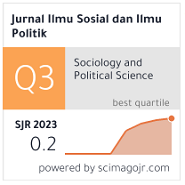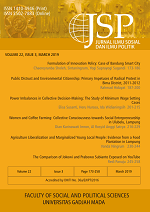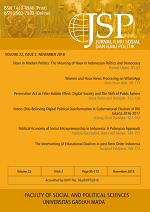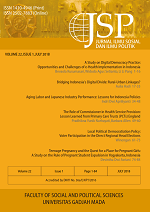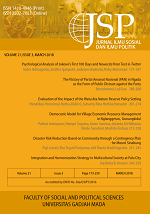The study of Seloko Adat as safety-valve to prevent religious conflict in Jambi City, Indonesia
Abdul Halim(1), Pahrudin HM(2*)
(1) Faculty of Ushuluddin and Religion Studies, UIN Sulthan Thaha Saifuddin Jambi
(2) Department of Governance Science, STISIP Nurdin Hamzah Jambi
(*) Corresponding Author
Abstract
Jambi City has the potential for social conflict, especially religious conflict related to the establishment of houses of worship. The history of religious conflict in Indonesia notes that houses of worship have always been a source of conflict which often leads to destruction and burning. Related to this, there needs to be an effort made so that this conflict is not prolonged, one option is by revitalizing the wisdom of local culture that grows in each region.This study was conducted using a qualitative research approach. This research was conducted in Telanaipura, Alam Barajo, and Kotabaru in Jambi City. The results of this study found that as a pluralistic area, Jambi City was also not spared from the conflict of the establishment of places of worship that occurred in three regions. However, the conflict that occurred was not prolonged because the people of Jambi City still adhered to the wisdom of the local culture in the form of Seloko Adat which is internalized through family, education and social environment. This internalization forms an obedient, rule-abiding and inclusive character inherent in Jambi City society. Seloko Adat is another form of contextualization of the Coser’s concept of the Safety-Valve which proved to be able to prevent the community from anarchic conflict. Since it has a significant potential to help foster peace in communities, there needs to be an understanding of Seloko Adat through a variety of activities, such as socialization in various formats and holding social activities with the theme of increasing understanding of it.
Keywords
Full Text:
PDFReferences
Agus, B. (2006). Agama dalam kehidupan manusia: pengantar antropologi agama. Jakarta: PT. RajaGrafindo Persada.
Anggraini, G. (2016). Internalisasi nilai-nilai pendidikan karakter pada masyarakat adat Dayak Ngaju. Jurnal At-Turats, 10 (2), 91-102. doi: 10.24260/at-turats.v10i2.667.g410
Ayatrohaedi (1986). Kepribadian budaya bangsa. Jakarta: Pustaka Jaya.
Badan Pusat Statistik (2019). Kota Jambi dalam angka 2019. Kota Jambi: BPS Kota Jambi.
Bakri, H. (2015). Resolusi konflik melalui pendekatan kearifan lokal Pela Gandong d i Kota A m bon. The PO LITICS : Jurnal Magister Ilmu Politik Universitas Hasanuddin, 1 (1), 51-59. Retrieved from http://journal.unhas.ac.id/index.php/ politics/article/view/133/pdf.
Coser, L. A. (1956). The functions of social conflict. New York: The Fre Press.
Crabtree, B.F., & Miller, W.L. (ed.). (1992). Doing qualitative research. London: SAGE Publications.
Creswell, J. W. (2007). Qualitative inquiry and research design: choosing among five traditions (2nd ed.). Thousand Oaks, London, New Delhi: Sage Publications.
Denzin, N. K., & Lincoln Y. S. (2009). Handbook of qualitative research (Dariyanto, Badrus Samsul Fata, Abi, & John Rinaldi, Trans.). Yogyakarta: Pustaka Pelajar. (Original work published 2000).
Fisher, S., Abdi, D. K., Ludin, J., Smith, R., Williams, S . , & Williams , S. (2009). Mengelola konflik: ketrampilan dan strategi untuk bertindak (SN. Kartikasari, Meiske D. Tapilatu, Rita Maharani, & Dwita Novita Rini, Trans.). Jakarta: The British Council. (Original work published 2000).
Haryanto, S. (2012). Spektrum teori sosial; dari klasik hingga postmodern. Yogyakarta: Ar- Ruz Media.
HM, Pahrudin (2011). Urgensi revitalisasi kearifan lokal di tengah ancaman bencana di Indonesia, UNISIA, 33 (75), 250-257. doi: 10.20885/unisia.vol33.iss75.art4
Idi, A. (2012). Harmoni sosial: interaksi sosial
‘natural-asimilatif’ antara etnis China dan Melayu Bangka. Thaqāfiyyāt, 13 (2),
361-383. Retrieved from http://ejournal. uin-suka.ac.id/adab/thaqafiyyat/article/ view/71/74.
Jamaludin, A. N. (2015). Agama dan konflik sosial: studi kerukunan umat beragama, radikalisme dan konflik antarumat beragama. Bandung: Pustaka Setia.
Johnson, D. P. (1998). Teori sosiologi klasik dan modern (Robert M.Z. Lawang, Trans.) Jakarta: Gramedia Pustaka Utama. (Original work published 1981).
Kimball, C. (2008). When religion becomes evil. USA: HarperCollins.
Lembaga Adat Provinsi Jambi (2003). Dinamika adat Jambi dalam era global. Kota Jambi: Author.
Lindayanty. (2013). Jambi dalam sejarah 1500-1942. Kota Jambi: Dinas Kebudayaan dan Pariwisata Provinsi Jambi.
Lulops, R. S., & Chan, D. D. (2000). Conflict from theory to action. USA: Allyn & Bacon. Mariane, I. (2014). Kearifan lokal pengelolaan hutan adat. Jakarta: PT. RajaGrafindo Persada.
Miles, M. B., & Huberman, A. M. (1992). Analisis data kualitatif (Tjetjep Rohendi Rohidi, Trans.). Jakarta: Universitas Indonesia Press. (Original work published 1984).
Mitchell, B., Setiawan, B. & Rahmi, D. H. (2003). Pengelolaan sumberdaya dan lingkungan. Yogyakarta: Gadjah Mada University Press.
Mufid, A. S. (2010). Revitalisasi kearifan lokal dalam pemberdayaan masyarakat. Jurnal Harmoni, 9 (34), 83-92. Nasikun (2004). Sistem sosial Indonesia. Jakarta: PT. RajaGrafindo Persada.
Oetojo, B. (2010). Sistem sosial budaya Indonesia. Jakarta: Penerbit Universitas Terbuka.
Poloma, M. M. (2004). Sosiologi kontemporer (Tim Yasogama, Trans.). Jakarta: PT. RajaGrafindo Persada. (Original work published 1979).
Rahad iansyah, T . & Prayitno, A. (2011). Transformasi nilai kearifan lokal dalam pendidikan bangsa: dialektika pendidikan berbasis local genius. Jakarta: Penerbit Universitas Trisakti.
Robertson, R. (Ed.). (1993). Agama dalam analisis dan interpretasi sosiologis (Akhmad Fedyani Saifuddin, Trans.). Jakarta: PT. RajaGrafindo Persada. (Original work published 1990).
Rosdiawan, R., Hudi, Z., & Saleh, I.M. (2007). Merajut perdamaian di Kalimantan Barat. in Alpha Amirrachman (Ed.), Revitalisasi kearifan lokal: studi resolusi konflik di Kalimantan Barat, Maluku dan Poso (pp.50-65). Jakarta: International Center for Islam and Pluralism (ICIP).
Sartini (2009). Mutiara kearifan lokal nusantara. Yogyakarta: Kepel Press.
Sofanudin, A. (2015). Internalisasi nilai-nilai karakter bangsa melalui mata pelajaran pendidikan agama Islam pada SMA eks- RSBI di Tegal. Jurnal Smart, 01 (02), 151- 163. doi: 10.18784/smart.v1i2.248
Suaedy, A. (2007). Politisasi agama dan konflik komunal: beberapa isu penting di Indonesia. Jakarta: The Wahid Institute.
Susan, N. (2019). Sosiologi konflik: teori-teori dan analisis. Jakarta: Prenadamedia Grup.
Suprapto (2013). Revitalisasi nilai-nilai kearifan lokal bagi upaya resolusi konflik. Jurnal Walisongo, 21 (1), 19-38. doi: 10.21580/ ws.21.1.235
Wirawan, I. B. (2012). Teori-teori sosial dalam tiga paradigma. Jakarta: Kencana Prenada Media Group.
Yin, R. K. (2004). Studi kasus: desain dan metode (M. Djauzi Mudzakir, Trans.) Jakarta: PT. RajaGrafindo Persada. (Original work published 1996).
Zakaria, Y. R. (1994). Hutan dan kesejahteraan masyarakat. Jakarta: Penerbit Walhi.
Article Metrics
Refbacks
- There are currently no refbacks.
Copyright (c) 2020 Jurnal Ilmu Sosial dan Ilmu Politik

This work is licensed under a Creative Commons Attribution-NonCommercial-NoDerivatives 4.0 International License.







